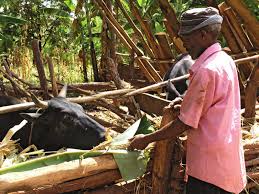

For a farmer to have a successful farming business, they must have adequate time for his farm. This is what has kept Henry Nsereko, commonly known as Nkokonyoole a 70 year old urban diary farmer going as a zero grazing dairy farmer. The retired civil servant’s farm is located in Kayanja village in Kasangati town council, Wakiso district.
How he started
He says he opted for farming because he wanted to set up an income generating business activity when he retired.
“As i clocked 55 years , I thought dairy farming would be the ideal business for me. To realize my vision, I two pure exotic in-calf cows at Shs. 600,000 each in 1997, he explains.
The in-calf heifers were usually older cows that had calved more than five times. Therefore, to get one, a farmer had to book in advance because Jesa Farm was the only one that exported exotic breeds in Uganda. He says he had bought five acres of land at Kayanja, where he set up a farm and got workers to look after his cows since he has still working. “because the workers did not closely supervise the cows, they both died of tick fever,” he says.
” I learnt a lesson. I saved money and by retirement in 1999, I had bought a Friesian cow at Shs 1.2m from a farmer in Ntinda, a city surbub. It is from this that I have raised 10 dairy cows,” explains Nsereko.
Nsereko has continued improving his breed. Today, he gets 30 litres of milk every day from one of his best milk-producing cows at peak time. Four of the 10 acres lactating and yield 60-7 litres per day. The other three are in the gestation period (pregnant). ” I have maintained 10 cows because I want to have quality. By having fewer cows, I can effectively look after them well, for better productivity,” he says. To maintain this number, he sells off cows that have calved five to six times at shs.3m to Shs.4m. “At times , I lalso sell in-calf heifers at shs. 4m to shs.5m. However, for the case of bulls , I sell them while still young,” he adds.
Mistakes and lessons learnt.
“Hiring workers before i retired taught me that most of them will never execute their duties as expected. I lost my two cows to tick fever since the worker did not take good care of them,” he says. He adds that for a farmer to earn handsomely from their farm, they must be there regularly. ” That is why now my job is my farm,” he says.
Market for the milk.
Nsereko , who is a member of the Kasangati Dairy Co-operative Society, is the the treasurer of the group. The society was formed by Dairy farmers in Kasangati town council and is used as a marketing tool for all members.”we have a dairy at Kasangati town, where we all take our milk in the morning and evening. I milk in the morning at 6am and in the afternoon at 1pm,” he says. The farmers sell their milk to the dairy at Shs 1,400 per litre and each farmer is paid according to their preference. However, for many , it is weekly. From this, he earns between Shs.686,000 and Shs. 588,000 a week.
Caring for the herd.
Nsereko feeds his cows mainly on grass. He planted five acres of elephant grass from which he processes silage that his cows feed on. “Cows fed on dry grass (hay, silage and haylage), give high quality and quantity of milk, Therefore, I continuously prepare silage for my cows to ensure that there is constant supply of feeds,” he says. He also buys sweet potato vines from which he also makes silage. “Sweet potato vines are very nutritious.” he says. He bought a tipper-motorcycles that his employees use to fetch potato vines from other farmers. A full load of potato vines goes for Shs. 15,000. “I bought a forage chopping machine that uses diesel to cut the vines and maize stalks into smaller pieces to make them palatable for the animals,” he explains.
He adds brewer’s residues to the feeds, especially when milking because it is tasty. Nsereko harvests rainwater from all the houses at the farm and stores it in an underground tank. He also has a borehole and piped water. “We do not have any challenges with water,” he says.
Hygiene and controlling diseases.
Nsereko’s cows are fully zero grazed. For this, he makes sure that the barn is kept clean all the time, to avoid germ infestation and insects that would cause diseases to the cows.
“We remove cow dung from the barn every day, and wash it every sunday. This way, we ensure that the barn is clean and dry,” Nsereko says. The cow dung collected is used in the home for cooking and lighting. “This has saved me money that would have been spent on electricity bills and buying firewood for cooking,” he adds. The bioslurry is used as fertilizer in our banana plantation, which is a source of matooke for home consumption. Some of the bioslurry is sold to the farmers who want manure at Shs.130,000 per lorry. “Every sunday, we also spray our cows, especially against ticks because the fever caused by ticks is the deadliest that it can kill a cow in two days,” he says.
Next Reading
Creating a cheap, easy protein source for your Chicken
It is no secret that bugs make delicious snacks for a chicken. Since chickens are […]
Previous Reading
Understanding tail docking in Sheep
Docking is the intentional removal of part of an animal’s tails or, sometimes, ears. The […]
 Contact Jaguza Support
Contact Jaguza Support